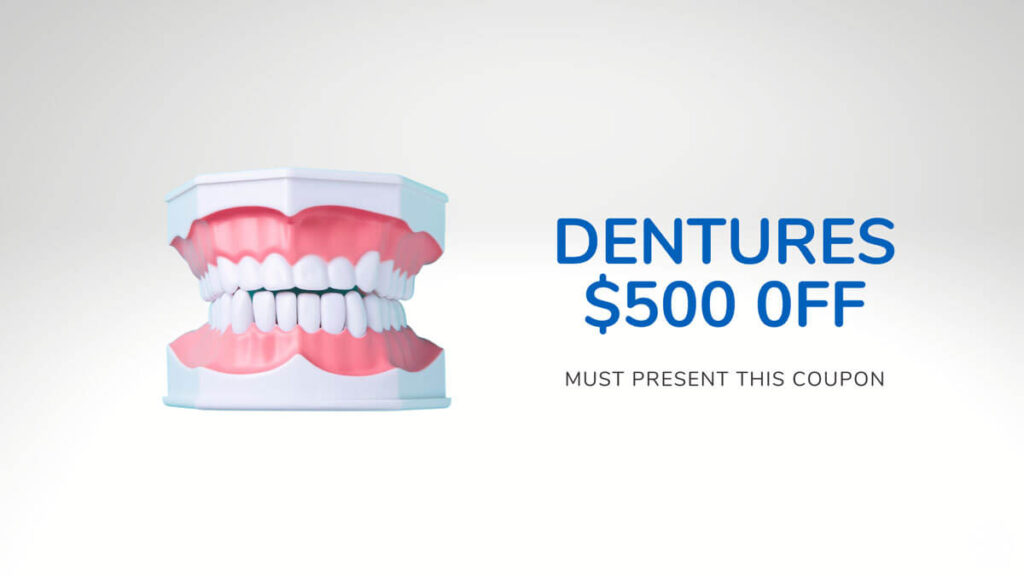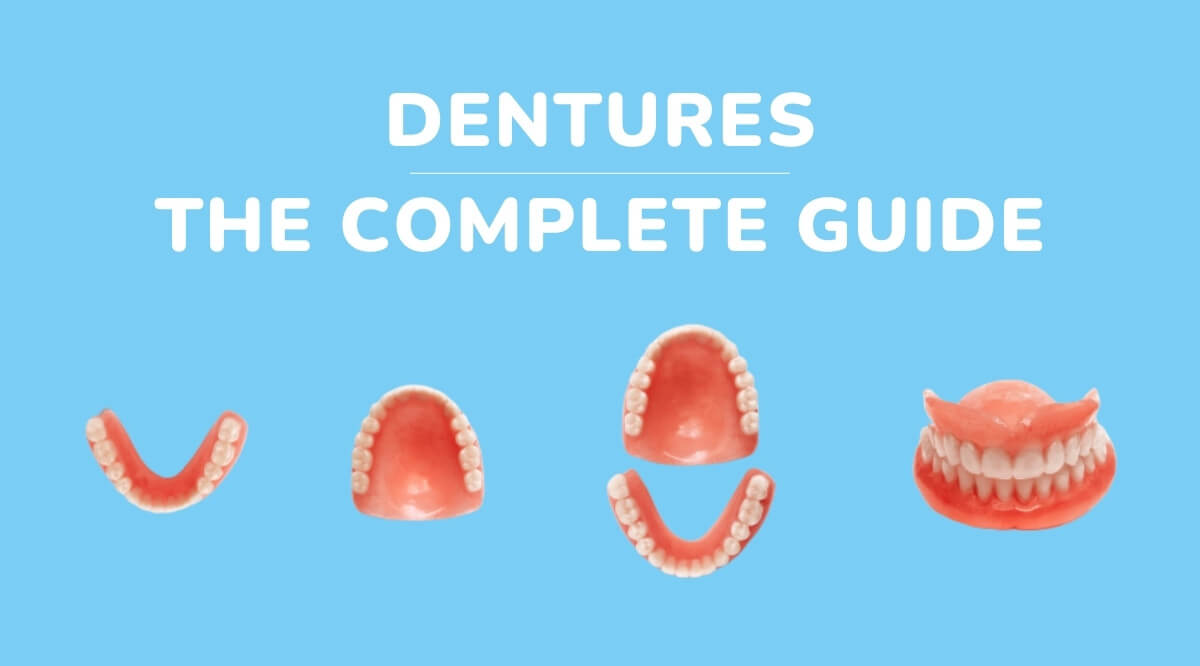Dentures are artificial teeth attached to a retainer-like appliance that you can remove when necessary. People choose dentures when they no longer have some or all of their natural teeth. Although wearing dentures requires a period of adjustment, they perform the same functions as your natural teeth and will feel more comfortable over time. Dentists also refer to dentures as prosthodontics.
Complete Guide To Your Next Dentures
Here are the topics you can expect to read about in this guide:
- Best candidates to receive dentures
- How to use dentures
- How long do dentures last?
- Types of dentures
- Instruments or materials used to create dentures
- How to maintain and clean dentures
- How to eat and sleep with dentures
- Denture adhesive
- Pros and cons of dentures
This guide also discusses the financial aspects of getting dentures.
- Cost of denture
- Financing options such as membership or discount plans
- Insurance options
Are You A Candidate To Receive Dentures?
Dentures are a realistic alternative for people who no longer have any natural teeth or need to have their remaining teeth extracted. They are also ideal for people who prefer a removable appliance over fixed dental implants. You can benefit from dentures if your remaining natural teeth make it difficult to chew food.
Choosing dentures typically comes down to patient preference and what the insurance company will cover. However, your gums need to be healthy enough to support the dentures during all waking hours.
Placing & Removing Denture
Most full and partial dentures require an adhesive to remain affixed throughout the day. You should apply the adhesive to the top side of your device and then hold it in your mouth for several seconds while creating pressure with your fingers. To remove your dentures before bedtime, hold the middle portion between your thumb and forefinger to gently loosen it and then pull once you feel that it has started to give way.
How Long Do Dentures Last?
Full dentures typically last between 5 and 10 years, while partial dentures can last as long as 15 years. Brushing your dentures, avoiding extremely hard or sticky foods, and visiting your prosthodontist regularly will help your dentures last as long as possible.
What Are The Different Types Of Dentures?
Patients typically receive one of these types of dentures:
- Conventional: Standard dentures should go in your mouth as soon as possible after you have healed from tooth extraction or trauma to the mouth. The process of receiving conventional removable dentures can take several months.
- Immediate: This is one of the newest offerings in dentistry, and you may also hear your dentist refer to immediate dentures as digital dentures. You receive your dentures the same day a dentist extracts your remaining teeth. Since your jaw can change shape as it heals, you may need to come in periodically to have your dentures adjusted.
- Over-denture: This type fits over your teeth that your prosthodontist was able to save. The benefit of an over-denture is that it preserves jawbone strength and supports bones and teeth.
- Digital Dentures: this type of digital treatment will allow you to receive much better fitted dentures, increase the durability of your dentures lifespan, while costing less. And help to reduce the overall procedure turnaround time with less appointment visits.
Materials Used To Create Dentures
Most dentures contain a type of plastic called acrylic resin. Porcelain dentures are another option. The first type is stronger, while the second type lasts longer. The reason plastic dentures are stronger is that acrylic adheres to the denture base more firmly. Acrylic resin dentures are also lighter and cost less than porcelain dentures. You should expect to replace plastic dentures every five to eight years and porcelain dentures approximately every 10 years.
How To Maintain & Clean Dentures
You must brush and care for your dentures just as you would your natural teeth. The consequences of not doing so can include oral thrush, inflammation, bad breath, and bone loss. Use a regular toothbrush each night to remove plaque from your dentures and be sure to hold your dentures over the sink with a washcloth while doing so. The washcloth protects your dentures from damage if you happen to drop them.
The next step in maintaining your dentures is to place them in a cup of water containing a special denture cleansing tablet overnight. Brush your dentures again in the morning before you put them in for the day.
How To Eat & Sleep With Dentures
The first time you eat with dentures, cut your food into smaller bites than usual. Once you start chewing, shift half of the food to your back right dentures and the other half to your back left dentures. This equalizes the pressure from biting your food and prevents one side of the dentures from wearing out too quickly. You may wish to start with soft foods until you become accustomed to eating with dentures in your mouth. Examples include eggs, pudding, and cooked vegetables.
You should plan to take your dentures out before going to sleep. This gives you the opportunity to clean them and also increases their longevity. The only exception is that you should leave immediate dentures in place for the first 24 hours. If your mouth feels uncomfortable, you can take non-prescription pain relievers. Try to sleep on your back to avoid your mouth touching your bed or pillow.
Denture Adhesives
The Food and Drug Administration describes denture adhesive as a pad, paste, or powder placed on your dentures to help them remain secured in your mouth all day. You will eventually learn your preferences after trying all types of adhesives.
Pros & Cons Of Dentures
Dentures offer many benefits, including restoring your chewing power, improving your aesthetics, affordability, and supporting your face and remaining teeth. Some people consider the adjustment period for dentures too long, but you cannot expect to adapt to such a major change overnight. Although dentures can break, being careful and taking good care of them greatly reduces the likelihood of this happening.
Cost Of Dentures & How To Pay For Them
The biggest determining factor in how much you pay for dentures is whether you receive traditional or immediate, full or partial, and the types of materials used to construct them. Here are the average costs as of early 2022:
- Acrylic partial denture: $769 to $1,079
- Flexible acrylic partial denture: $1,259 to $1,579
- Cast metal partial denture: $1,469 to $1,824
- Upper and lower conventional denture: $1,649 to $2,219 each
Keep in mind that the costs listed are for one denture. You will pay more if you need both rows of teeth replaced. After obtaining your estimate, contact your insurance company to determine how much it will pay for your dentures. You will then need to determine how to cover any out-of-pocket costs. At Voss Dental we accept several forms of payment, including cash, checks, and major credit cards. We also offer in-house low-cost financing through financial partners such as local banks and businesses that specialize in healthcare financing.
Another option to finance your dentures is to join a discount or membership plan for $299 per year. While this is not dental insurance, it will reduce the cost you pay for dentures and other major procedures.
$500 OFF – Denture Special Offer
You can also take an advantage of our $500 OFF offer to help you to reduce the cost of your dentures

Step-by-Step Journey to Obtaining Dentures
The typical dental patient goes through each of the steps below when getting dentures for the first time.
- Tooth extraction due to severe decay, dental disease, or trauma.
- Visit a prosthodontist to have an impression of your teeth made.
- Impressions are sent to Lab or
- Select your new teeth based on the aesthetics you prefer.
- Come in for an initial fitting.
- Decide if you want immediate or traditional dentures.
- Begin wearing and adjusting to your dentures, coming in for appointments with your prosthodontist as necessary.
Frequently Asked Questions (FAQ) About Dentures
Where can I find a prosthodontist to place my dentures?
Ask your regular dentist for a referral, check with your insurance company for any restrictions, ask friends and family for recommendations, or check online.
What should I expect when I visit a prosthodontist?
The doctor will do a visual inspection, take several X-rays, and form a mold impression of your teeth for treatment planning purposes. You will have the chance to discuss different types of dentures and ask questions about treatment.
How will I know how much my treatment costs?
The dental team should provide you with a written estimate at the end of your initial consultation.
Are there things I can’t eat when I have dentures?
Yes. Your prosthodontist will go over a list of food restrictions at your first appointment. But here are a few items that you want to limit eating as much as you can.
Is there one person I can go to with financing costs and general questions?
Once you have received your prosthodontics consultation, you will be presented with a treatment plan that covers the cost of your dentures, in-addition to that you should ask the treatment coordinator about any financing options or discount plans that can help in reducing the cost of your denture.
Ready For Your New Dentures?
Getting dentures is a big decision, but you should not delay replacing lost teeth to avoid additional dental problems. Our dental practice is here to answer all your questions. Please visit our website to book an appointment online or call us at your earliest convenience.

